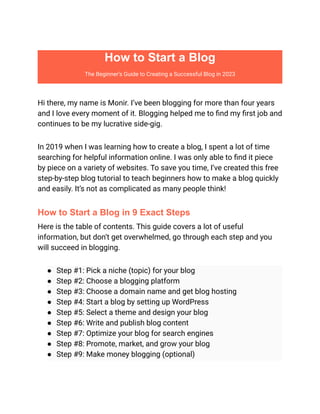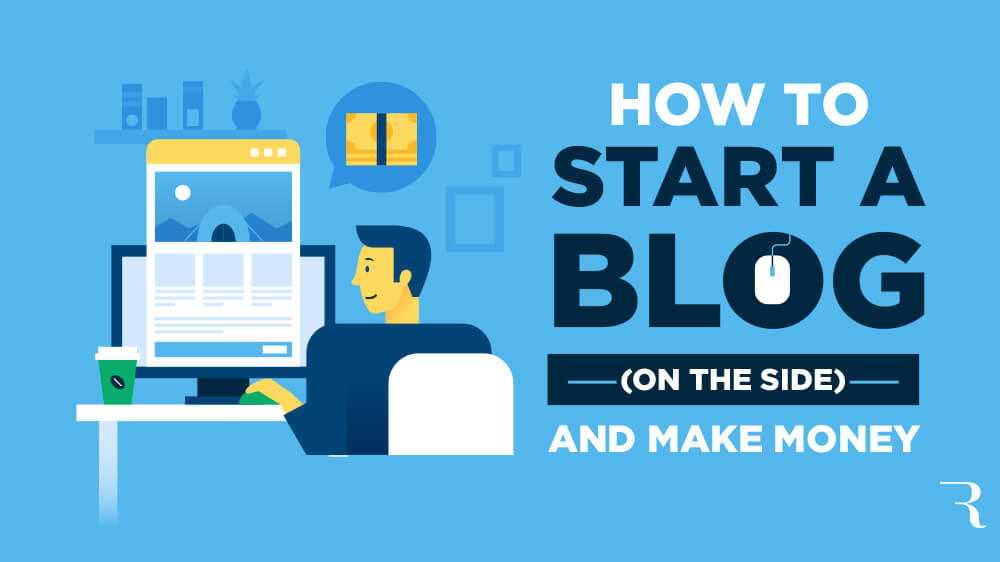To start blog writing as a beginner, choose a niche, create engaging content, and promote it on social media. Research popular topics and use SEO strategies to improve visibility and readership.
Developing a consistent posting schedule is crucial for building a loyal audience base. Focus on providing value and unique perspectives to attract and retain readers. Gain inspiration from other successful bloggers but maintain your own voice and authenticity. Always remember that practice makes perfect in the world of blogging.

Credit: www.slideshare.net
Choosing A Niche
Choosing a Niche: When starting a blog, consider your Passion or Profit. Research what the market demand is. Find a topic that you enjoy and has potential.
Credit: www.ryrob.com
Setting Up Your Blog
When starting a blog, begin by choosing a platform that suits your needs. Select a domain name that is memorable and relevant to your content.
Creating Valuable Content
When starting blog writing, it's important to understand your audience. Take time to research and know who you are writing for. This will help you create content that resonates with your readers. Additionally, planning your content calendar ensures a consistent flow of valuable content. This can help in maintaining regular posts and keeping your audience engaged.

Credit: www.ryrob.com
Building A Community
Building a community is an essential aspect of successful blog writing. Engaging with readers is key to creating a loyal following. Interacting with them through comments and responding promptly will help foster a sense of connection. Additionally, actively participating in social media platforms can greatly expand your reach and attract new readers. Sharing your blog posts on platforms such as Facebook, Twitter, and Instagram allows you to engage with a wider audience. Furthermore, utilizing social media features like hashtags and tagging relevant accounts can help increase visibility. Remember to respond to comments and messages on social media as well, as this shows your readers that you value their input and are interested in their thoughts. Overall, building relationships with your readers through engagement and utilizing social media can greatly contribute to the growth and success of your blog.
Monetizing Your Blog
When it comes to monetizing your blog, exploring different revenue streams is crucial. One popular method is implementing affiliate marketing. With affiliate marketing, you can earn a commission by promoting products or services on your blog. It's important to choose affiliate partnerships that align with your blog’s niche and target audience. Research different affiliate programs and select ones that offer competitive commission rates and provide valuable resources for promoting their products. By integrating affiliate links strategically throughout your blog posts, you can increase the likelihood of generating sales and earning commissions. Remember to disclose your affiliate relationships ethically, in compliance with the regulations and guidelines provided by your country or region. Additionally, regularly analyze the performance of your affiliate marketing efforts to optimize your strategies and maximize your earnings.
Frequently Asked Questions For How To Start Blog Writing: A Beginner's Guide
How Can I Start Blog Writing As A Beginner?
Starting blog writing as a beginner requires three key steps: finding your niche or topic of interest, setting up a blog platform or website, and creating high-quality content. Research your niche and audience, choose the right blogging platform, and start writing and publishing compelling blog posts.
How Long Does It Take To Become A Successful Blogger?
Becoming a successful blogger takes time and consistency. It can vary depending on various factors like niche, content quality, promotion strategies, and audience engagement. On average, it may take anywhere from 6 months to a few years to build a successful blog with a significant audience and income.
What Are The Essential Elements Of A Good Blog Post?
A good blog post has several key elements. It should have a catchy title, an introduction that grabs readers' attention, well-structured headings and subheadings, quality content with relevant keywords, relevant images, and a clear call-to-action. Balancing information, readability, and engagement makes a blog post effective.
Conclusion
Starting a blog is an exciting journey that requires passion, consistency, and an understanding of your target audience. By implementing the tips and strategies discussed, you can navigate the blogosphere with confidence and effectively connect with your readers. Remember, it's not just about writing, but also engaging and building relationships through your content.
